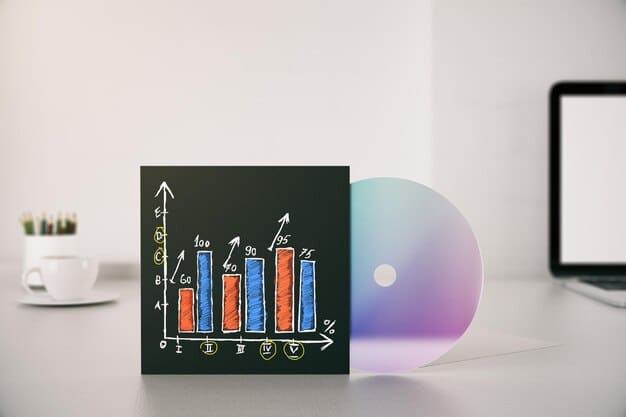K-Pop Music Show Wins: Do They Boost US Album Sales?

K-Pop music show wins often correlate with increased visibility and, potentially, a surge in US album sales in the month following the win, though the impact can vary depending on the group’s existing fanbase and promotional strategies.
The electrifying world of K-Pop is known for its meticulously planned comebacks, catchy tunes, and visually stunning performances. But what happens when a group scores a coveted win on a Korean music show? Does this victory translate into tangible gains in the US market? Let’s delve into how K-Pop Music Show Wins: How Do They Impact US Album Sales in the Following Month?
Understanding K-Pop Music Shows and Their Significance
K-Pop music shows are weekly televised programs that showcase performances from various artists. These shows aren’t just about entertainment; they’re a battleground where groups compete for the top spot, determined by a combination of factors. Understanding their importance is crucial before analyzing impacts on US album sales.
What are K-Pop Music Shows?
These shows are a staple of Korean television, broadcasting performances by both established and rookie K-Pop groups. Winning a music show is considered a significant achievement and a marker of success within the industry.
Criteria determining Wins on Music Shows.
The criteria for determining the winner vary between shows, but typically include digital sales, physical album sales, social media scores, viewer votes, and broadcast points. These wins often signify the peak of promotional periods.
- Digital Sales: Streams and downloads from Korean music platforms.
- Physical Album Sales: The number of albums sold during the tracking period.
- Social Media Scores: Engagement on platforms like YouTube, Twitter, and Instagram.
- Live Voting: Real-time votes cast by viewers during the broadcast.
Winning a music show can significantly elevate a group’s visibility and reputation within Korea. It can also contribute to hype and momentum, and impact the chances of recognition internationally.

The US Album Market: A Unique Landscape
The US music market operates differently from the Korean one. Album sales, streaming numbers, and radio play are key components to chart success. Let’s explore the intricacies of the US album market and how K-Pop fits into it.
How US Album Sales are Measured?
In the US, album sales are tracked by companies like Luminate (formerly Nielsen SoundScan), which compiles data from various retail outlets and online platforms. The official Billboard charts use this data.
The Role of Streaming and Digital Downloads
While physical album sales are still relevant, streaming makes up a significant portion of music consumption in the US. Digital downloads, though declining, also contribute to overall numbers.
K-Pop’s influence on the US album is steadily growing, and album sales increased as the international fanbase grows.
Analyzing the Immediate Impact of Music Show Wins
What happens when a K-Pop group clinches a music show win in Korea? The immediate effect is a boost in domestic publicity. How does this initial surge affect the group’s prospects across the Pacific?
Initial Publicity Boost
Music show wins often lead to increased media coverage in Korea, which can then translate into more visibility on international platforms. This heightened exposure can pique curiosity among potential fans in the US.
- Social Media Buzz: Fans celebrate and share the news, amplifying the group’s reach.
- Media Attention: Articles and news segments highlighting the win can appear on international K-Pop news outlets.
- Increased Engagement: New listeners may check out the group’s music after hearing about the win.
The immediate impact often involves increased streaming numbers and social media engagement, but the tangible increase in US album sales in the following month is subject to additional variables.
Correlation vs. Causation: Untangling the Data
Even if K-Pop group album sales rise in the US following a music show, can this increase be directly attributed to the music show win? Correlation does not equal causation, and several confounding factors have to be considered.
Understanding Confounding Variables
Other variables can play a role in sales trends, thus making concrete conclusions difficult. Factors could potentially include tour schedules, US television appearances, or the release of different versions of albums.
It’s vital to analyze the data contextually, and take into account all coinciding promotional activities. This also applies to any special events in the US that could lead to a surge in purchase interest.

Case Studies: Examining Album Sales Data
To gain a clearer understanding, let’s examine specific cases of K-Pop groups who have won music shows and analyze their US album sales data in the subsequent month. These case studies will help illustrate patterns and possible influences.
Group A: Consistent Growth Driven by Wins
Group A, an established group with a strong international fanbase, consistently experienced a bump in US album sales after each music show win. This could be attributed to their loyal fanbase eagerly supporting their success.
Group B: Moderate Impact on a Rising Act
Group B, a rising act still gaining traction, saw a more moderate impact on US album sales following their music show wins. The wins helped maintain their visibility but did not translate into a dramatic increase in sales.
- Fan Engagement: Even moderate increases can be significant for a growing act.
- Long-Term Growth: Continuous wins contribute to long-term brand recognition.
- Building Momentum: Each win can drive incremental growth.
While certain groups will see an explosion in success, others only experience more moderate gains. These differences emphasize that market conditions and promotional efforts should not be overlooked.
Strategies to Leverage Music Show Wins for US Market Growth
For K-Pop groups looking to maximize the impact of their music show wins on US album sales, there are specific strategies they can employ. These initiatives will aid in converting increased visibility into tangible sales.
Targeted Marketing Campaigns
Launch targeted marketing campaigns in the US immediately after a music show to capitalize on the heightened interest. This includes ads on social media, partnerships with US-based influencers, and collaborations with streaming platforms.
Collaborations and Partnerships
Collaborate with US artists or partners to expand reach and introduce the group to new audiences. Partnership opportunities could include music videos, performances, or joint appearances.
By executing strategies that amplify awareness and build anticipation, K-Pop groups can more effectively translate the buzz around music show wins in meaningful gains in the US market. Concerts help a lot to grow their fanbase and visibility.
| Key Aspect | Brief Description |
|---|---|
| 🏆 Music Show Wins | Boost initial publicity and visibility in Korea. |
| 📈 US Album Sales | Show potential increase post-win, but it varies. |
| 📢 Marketing Strategies | Leverage wins with targeted ads and partnerships. |
| 📊 Confounding Factors | Other promotions and events also play a huge part. |
FAQ
▼
Not necessarily. They boost visibility, but other factors like marketing and existing fanbase impact sales.
▼
Marketing maximizes the impact of wins by targeting new audiences and fostering engagement.
▼
Yes, streaming impacts music show wins, which is why it’s important to target streaming platforms too.
▼
A larger fanbase with a bigger loyalty generally results in higher initial album sales and continued support.
▼
Definitely. Live events boost both visibility and direct music experiences—which translate into better sales performance.
Conclusion
While K-Pop music show wins don’t guarantee a surge in US album sales, they provide a significant boost in visibility and momentum. By leveraging these wins strategically, K-Pop groups can increase their chances of making a lasting impact on the US music market.





